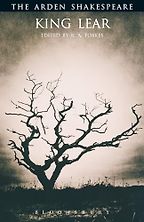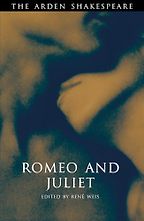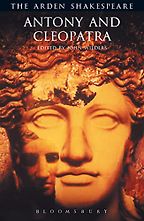You’ve used King Lear as the basis of a biography of Shakespeare. What has Shakespeare meant to you in your own life?
King Lear is a play that changes your life. How could it not? I have used it in my biography, it’s true, not necessarily with a view to finding out about Shakespeare’s life, but as a play which has meant an awful lot to me in my own life. I think it was the moment when I realised that this is what I wanted to do. It’s a play that grabs you and will never let you go, the way no other work does. It asks such fundamental questions about who we are. It’s also a play which is incredibly accessible. It’s a play that carries us with it, in spite of the immensity of suffering portrayed in it.
You’ve also edited an edition of King Lear: the Parallel Text Edition. Could you tell us about the play’s textual history and what your approach to it was?
The textual history of the play is very, very contested. It started with the really famous Oxford Shakespeare in 1986 or ’87 when the editors argued very persuasively that Shakespeare wrote the work twice. He wrote it once, published in quarto, then a second time, which is the text preserved in folio. I was asked to do a parallel text showing the quarto and folio of King Lear on facing pages. There is a book coming out very shortly which is going to argue—I suspect, fairly persuasively—that Shakespeare did not re-write and the jury is out. The fact is that even if there are or were two different versions of the play, they are both in their own right probably equally wonderful.
This year is the 400th anniversary of Shakespeare’s death. How contingent is our understanding of his plays on the editions that we have of his work?
One would have to say the First Folio of 1623 exported Shakespeare into England and then into the world. In a strange way, this most brilliant of dramatists is really a creature of the book. Having said that, the plays—not only through subsequent editions—have lasted the course and have done so sometimes in spite of all the academic work done on them. They are alive, they are buoyant.
“This was the son of a glover, and he was a brilliant son of a glover, undoubtedly, the most brilliant person who’s ever lived, perhaps.”
Very recently, in the last year and a half, a number of books have appeared which demonstrate that Shakespeare is the primary literary export from this country. In fact, he is the world’s favourite author by a long way: in China, in India, in Africa. A book has just come out about Shakespeare in Swahililand, a brilliant book—and so Shakespeare is everywhere.
To return to King Lear, there’s a famous Nahum Tate adaptation [which added a happy ending, among other changes] which was the version performed for about 150 years. Do you think there’s something about the early modern period and modernity that means that this play could be performed in its more tragic form during these eras?
It is unforgiving, it’s a very, very bleak work. It’s a work about nothingness. The words ‘nothing’ and ‘zero’ are everywhere in the play. They are ultimately the reason why we think it is so, Beckettian, so absurdist, so modern. But those are ultimately solecisms, anachronisms. At the end of the King Lear, there are no women, so it is a play of complete desolation and deadness. But because of this magnificent rhetoric, because of the sheer brilliance and passion of the insights in the play into our human condition, it has lasted.
“King Lear is a play that changes your life. How could it not?”
The very first line of the play is ‘I thought the king had more affected the Duke of Albany than Cornwall’, and that word ‘affected’, affection, becomes everything this play is about. It is about the human soul, about instincts, about how it is important that royalty, for example, has to be earned through decency. It’s a very powerful and very engaged, committed work.
Shall we move on to A Midsummer Night’s Dream? All of the other plays that you’ve chosen are tragedies, and so this one stands out on this list.
I wasn’t even aware of the fact that the others were all tragedies. I just chose the ones I liked best.
A Midsummer Night’s Dream is a play of intoxicating beauty and magic, and it’s a play which I loved as a child. It’s a play which takes you into this world of woodland madness. The word ‘wood’ in English means both a forest and madness. I have a childhood memory of seeing the 1935 Max Reinhardt film—with music by Mendelssohn—of A Midsummer Night’s Dream, and it never gets out of your system.
I know there are dark interpretations of the play—dangerous ones—and of course the young women who are so vocal and so funny in the woodland don’t say anything at the end of the play, they are silent. That’s presumably a patriarchal template being re-imposed on the play at the end, but in the meantime we have been through this magical, topsy-turvy, poetically incredibly beautiful world. I love it.
How seriously do you think we should take magic and enchantment in Shakespeare’s plays?
Oh, I think very seriously. After all, the play starts with Athens: a world of reason, of rational philosophy, of the subjugation of women—Theseus and Hippolyta and all that—and we are told that the law of Athens cannot be subverted. Then what happens? The lovers elope into the forest, into the wood, and everything is turned inside out. They are bewitched and it is always pointed out, quite rightly, that the love juice is not taken off the eye of Demetrius at the end, so he goes back into the real world literally transformed, not unbound from the magic. I think Shakespeare is clearly on the side of this kind of carnivalesque magic, this world where everything goes. It is also, I have to say, an extremely funny, brilliant play.
I saw a recent production at the Globe; the audience was absolutely beside themselves with laughter at the Mechanicals. What does the play within the play tell us about the way that Shakespeare viewed the theatre?
I think Shakespeare is extremely self-conscious about the theatre. He was a man of the theatre: lives the theatre, breathes the theatre, writes for specific people in the company on more than one occasion, so I think of course the mechanicals are hilariously funny.
“It’s as if Shakespeare is saying: it is a play after all. It’s only a play”
If people interpret A Midsummer Night’s Dream as if it were some Websterian tragedy that seems to me to go against the grain of the work. It is a brilliantly funny, in many ways innocent work. It recognises that we are creatures of the body, of our sexualities, as much as we are creatures of spirit and mind and decency, and it is sometimes a wonderful active release. The play within the play is the quintessence of theatre. Pyramus and Thisbe are in a way of course Romeo and Juliet by another name, but they are also a reflection on what has been going on inside the main play. Perhaps it’s showing us that it could be tragic, it could be comic, but we don’t have to be too serious about it. It’s as if Shakespeare is saying: it is a play after all. It’s only a play.
Next up, we have Romeo and Juliet. This is another play that you’ve done an edition of. Tell me about why you chose it?
The play (which I’ve, again, known all my life) is Shakespeare’s most popular. It’s more popular than Hamlet, more popular than any of the other tragedies or plays. It’s got this unbelievably brilliant heroine who’s two weeks short of her fourteenth birthday. We know more about Juliet than we know about any other of Shakespeare’s major figures. She has the third largest female speaking part in the whole of Shakespeare, after Cleopatra and Rosalind. She’s a hugely important figure.
“Juliet’s ‘What’s in a name?’ is a challenge to all forms of bigotry, and stupidity, and otherness”
It’s a companion piece, almost, to A Midsummer Night’s Dream. They are very much of the same period, these two plays, the same magnificent poetry. In this play, Shakespeare explores issues of rhetoric and language. How do you express teenage love? The first time Romeo sees Juliet, his language changes. It moves into a different key from the language he uses about Rosaline, which is a kind of sub-Petrarchan rhetoric, full of the usual kind of conceits, oxymorons, and so on. Romeo and Juliet’s language becomes extraordinarily dynamic, kinetic, full of the most extraordinary images of darkness and light which almost have a life of their own. This is rhetoric at its most highly wrought. ‘What’s in a name?’ It couldn’t be simpler, but this is Shakespeare’s magic: to generate lines that are more powerful for being very, very simple. Juliet’s ‘What’s in a name?’ is a challenge to all forms of bigotry and stupidity and otherness. She is saying: you are what you are, I love this boy because he is who he is.
It’s so much a play about adolescence. Is that something we see in any other of Shakespeare’s plays?
There’s nothing quite like it anywhere in Shakespeare, except possibly Miranda in the last play [The Tempest]. Interestingly, this may be entirely tendentious, but Shakespeare’s daughter, Susanna, was thirteen when he wrote Romeo and Juliet, and of course his son Hamnet, one of the two Shakespeare twins—the other one being Judith—died in 1596. So this play almost certainly coincides with the death of the poet’s own son, which makes it, if that is the case, even more of a miracle because Shakespeare is so determined that these two young lovers commit suicide. Suicide in the period was self-murder and was punishable by death, but nowhere in the play does Shakespeare convey a sense of these two as having committed a mortal sin. He celebrates them all the way. Juliet kills herself, showing extraordinary courage, with Romeo’s dagger, and we’re never meant to think that she’s thereby damning herself. I think we are meant to think that she’s going to re-join her husband, as she is indeed.
As you’ve said, Juliet’s this fascinating character—she has so much to say and she’s so well characterised—but she’s very restricted in her social ambition and capabilities because she’s a woman. How interested do you think Shakespeare is in issues of gender?
Hugely, in this play. The conquest of Juliet, if I’m going to put it that way, is after all Romeo’s invasion of her home. First of all he gatecrashes her parent’s party, then he moves into her orchard, and finally he moves into Juliet’s bedroom. One mustn’t forget their extraordinary wedding night, which ends when he wakes to leave. She is the first to speak after the wedding night, which is quite significant.
Juliet is brilliantly, and of course emphatically, realised as being part of her family. We know exactly how old she is, but Romeo could be sixteen, seventeen, eighteen, nineteen, we have no idea. He’s out all night, no one needs to care, that’s what young men do. The moment Juliet trespasses, her father—who of course doesn’t know she’s married—turns on his daughter with a vehement violence that is very, very shocking.
And her wet nurse reminisces about her when she’s three.
Absolutely. And of course there’s a clue in the very last line of the play: ‘Never was a story of more woe | Than this of Juliet and her Romeo’. The use of the possessive in that very last line means the story is not Romeo and Juliet, but Juliet and her Romeo. The fact that she has an English name—she’s not called Julietta, she’s called Juliet—means she’s one of ours. There’s a sense in which Shakespeare’s investment in her seems to me very personal, very direct, very powerful and he can’t actually let Juliet go any more than Romeo can let her go. I think that’s part of the power of the play.
“Shakespeare’s daughter, Susanna, was thirteen when he wrote Romeo and Juliet ”
Shakespeare’s very good on young women. That’s why the young women rule the roost in all of Shakespeare’s comedies. The only really tragic female figure in all of Shakespeare is probably Juliet. We’ll come to Cleopatra, but Cleopatra’s a different bracket, she’s middle-aged, it’s a different world, as it were, from that of Juliet. With Juliet, there is this tremendous sense of waste and pity and, to my mind, an unmistakable love by the poet for this particular young woman, the thirteen year old.
Juliet speaks thirteen lines in the last scene, and she dies on line thirteen. The word ‘thirteen’ never occurs in the play, her age is always defined with reference to fourteen, so Shakespeare’s very conscious of this kind of doom hanging over poor Juliet. But he gives her a tremendous run for her money, no doubt about it, and thank goodness for that.
Let’s move on to Antony and Cleopatra. Tell me why you chose this play as your fourth favourite?
I did a preface for the new Penguin edition of it, but in fact it was my PhD play and I’ve loved it ever since. It’s a play where, as a good friend of mine once put it, Shakespeare felt he could do whatever he wanted to do in language. It’s linguistically and rhetorically the most brilliantly inventive of all of Shakespeare’s plays. It’s full of the most crazy rhetoric. Lines like ‘The crown o’ the earth doth melt’; ‘Eternity was in our lips and eyes, | Bliss in our brows’ bent’. It’s a riotous play, a carnivalesque play, a play about middle-aged adultery. It’s not really a tragedy. Many years ago A. C. Bradley, a distinguished critic of Shakespeare, said for tragedy this play is not painful. Coleridge, another wonderful critic of Shakespeare, said this is perhaps the play in which Shakespeare shows his genius at its fullest because he just lets fly, he lets rip.
Do you want to pursue that comparison between Cleopatra and Juliet? What kind of a female character is Cleopatra?
Cleopatra is very much a creature of language, and her language is unbelievably inventive, as indeed is Antony’s. As a female character, Cleopatra is emancipated, but at the end of the play, she says ‘Husband, I come: | Now to that name my courage prove my title!’ Here is the world’s greatest courtesan, the lover of Julius Caesar, and of Antony and of countless others, with a loud moment of auto-idealisation at the end of the play. People used to think that this is on some level a morality play in that it ends with a defeat of Antony and Cleopatra at the hands of Octavius Caesar, who’s a kind of moral, puritanical character. I think nothing could be further from the truth, I think Shakespeare just runs with them.
“Cleopatra, in my book, is ultimately a brilliant Falstaffian comedy figure ”
In terms of gender Cleopatra is not a tragic figure. She’s an adult so there is no sense of unimaginable waste as there is at the end of Romeo and Juliet. There’s a kind of celebration. Dying in Romeo and Juliet is very real while in Antony and Cleopatra almost every time the word ‘dying’ occurs it’s Shakespeare playing on this idea of dying and human sexuality, which is a pun in the period. ‘Peace, peace! | Dost thou not see my baby at my breast, | That sucks the nurse asleep’, she says at the end of the play, as if this was some kind of Madonna image, or Christ-like image, and Antony compares himself to Christ. These images, these Christian images that invade Antony and Cleopatra, the ultimate pagan story, help to wrench it away from this finality of death. ‘Unarm, Eros; the long day’s task is done, | And we must sleep,’ Antony says, and this aligning of sleep and death in Antony and Cleopatra tends to mitigate and work against the play’s tragic momentum, so it’s not particularly painful, it’s not particularly tragic. Cleopatra, in my book, is ultimately a brilliant Falstaffian comedy figure.
Could you talk about this play in the context of the other classical plays?
It’s quite different really. The classical plays are Julius Caesar of course, Coriolanus, Antony and Cleopatra. In Julius Caesar, the characters have changed completely. Antony is a Machiavellian strategic thinker in Julius Caesar, but the Antony of Antony and Cleopatra is a grizzled lover who, in some ways, has lost all sense of proportion: ‘Let Rome in Tiber melt and the wide arch | Of the rang’d empire fall … Kingdoms are clay’. All that stuff couldn’t be further from the relative austerity of Julius Caesar.
“It’s Shakespeare’s most opaque play; brilliant but austere, but hard to love”
Coriolanus is Shakespeare’s most opaque play; a brilliant but austere and, it seems to me, hard to love play, whereas Antony and Cleopatra is a riot. There have been very many famous Coriolanus’s: Alan Howard was a legendary Coriolanus in the 1970s; Charles Dance played a wonderful Coriolanus. Funnily enough, there has never been a great production of Antony and Cleopatra. You wonder why—perhaps because the language of that play pulls, as it were, towards poetic inventiveness at the expense of the drama? Impossible to say.
Your final choice is Macbeth. Why did this make your list?
It’s been haunting me all my life. I did it at school, of course, everybody does Macbeth at school at some point or other. It’s extremely popular in Africa, and it’s extremely popular in the Far East and so on, because it’s short, and it seems to fulfil all the criteria of a Shakespearean tragedy: the man who is not altogether good nor altogether bad, who has a wife who is egging him on to do something for love of her.
It is very powerful and it’s a play which involves magic, and Shakespeare loves all that stuff. It’s also a play which is very much of its day. This is a Jacobean tragedy and it deals with treason, and particularly the murder of a king, when the Gunpowder Plot was still very much a recent event. Shakespeare undoubtedly refers in the porter’s scene—a scene that almost certainly was not performed when the play was first written—to the execution of Father Henry Garnet [for his involvement in the Gunpowder Plot]. Father Garnet’s cover name was ‘Farmer’, and Farmer is one of the equivocators mentioned by the porter.
“I read Macbeth at school, of course. Everyone does Macbeth at school at some point ”
It’s wonderful stuff. It comes immediately before Antony and Cleopatra and it has the same rhetorical brilliance. That speech: ‘If it were done when ‘tis done, then ‘twere well | It were done quickly’ in Act I Scene VII, when Macbeth contemplates murder, the murder of his king, seems to me Shakespeare’s greatest soliloquy. It’s metaphorically incomparable, and there are lines in it that just make you want to weep. The most wonderful line in my book, and there are so many wonderful lines, is when Lady Macbeth has realised that her husband has done something really dreadful, and she is mad, and she says ‘The Thane of Fife had a wife. Where is she now?’ Again, the simplicity of the lines underpins their extraordinary power to move.
Get the weekly Five Books newsletter
This is a play that’s incredibly intense and haunting, and curiously moral. Holinshed[‘s Chronicles], the main source of the play, has Macbeth looking for Macduff to kill him. Shakespeare stands this on its head: ‘of all men else,’ Macbeth says, ‘I have avoided thee | … My soul is too much covered with blood of thine already’. So at the end of the play, Shakespeare is quite prepared to give Macbeth, who has killed children, who has killed women, who has killed his king, a moment of moral recrudescence, I think because he has got to know Macbeth too well.
Do you think, in relation to James I, it’s a play about childbirth and lineage?
I think lineage and childbirth are extremely important, after all Macduff is a man ripped untimely from his mother’s womb. Legitimacy comes into it undoubtedly. And of course, King James’s claim to the throne was probably quite dodgy. Did Elizabeth really say who better to succeed than the King of Scots or was it Robert Cecil who felt that for the sake of the kingdom it was best that someone who was a king, who was Mary Queen of Scots’ son, should succeed? Impossible to say, but the play undoubtedly carries a tremendous political charge.
I know that James I fancied himself as a witchcraft detector, he persecuted poor old women all over Scotland and burnt them at the stake; he had a terrible past in that sense. Shakespeare is undoubtedly playing to the Scottish gallery to some extent, giving the new king a play he must be interested in, and of course he was. King Lear was performed on Boxing Day at court in 1606, his next play, after King Lear, is Macbeth, the next play is Antony and Cleopatra. There’s an extraordinary array of masterpieces coming one after the other, and they all deal with issues that are very close to the bone. I marvel and wonder at Shakespeare’s incredible guts. This was the son of a glover, and he was a brilliant son of a glover, undoubtedly, the most brilliant person who’s ever lived, perhaps, but for him to sail so close to the wind of politics is striking.
Five Books aims to keep its book recommendations and interviews up to date. If you are the interviewee and would like to update your choice of books (or even just what you say about them) please email us at [email protected]
Five Books interviews are expensive to produce. If you've enjoyed this interview, please support us by donating a small amount.












